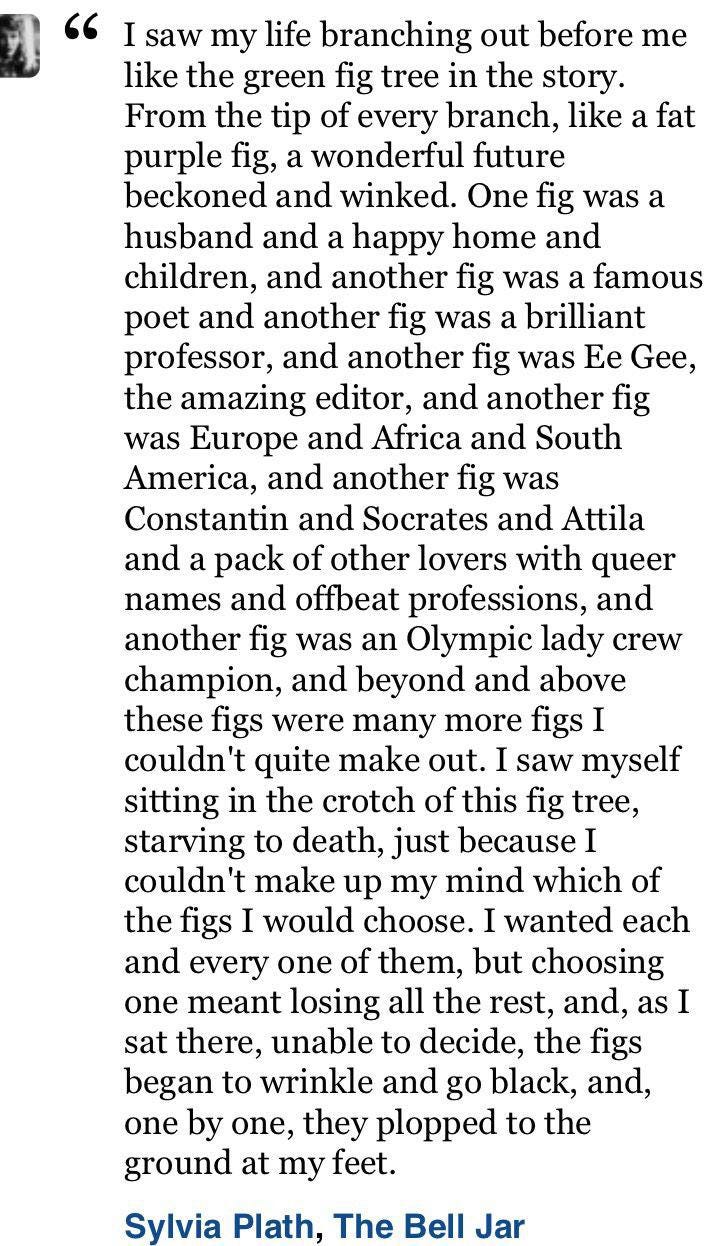Dear Meg,
I can’t figure out my career. Very much fig tree by Sylvia Plath vibes. I’m 26 and feel discouraged but still feel weirdly optimistic. I think the biggest problem is balancing long-term life responsibilities and a career I feel good about. I worry I can’t have both.
—
Dear Meg,
How the f—k do I ACTUALLY know what I want to do for a career? There are folks “in finance” that essentially do HR and aren’t CPAs. How do I know that AI won’t make all of marketing and copy obsolete within 10 years? Should I go into cybersecurity? How do I know if I would enjoy something without having worked in the field yet?
Sincerely,
Figs In The Road
Dear Figs In The Road,
Forgive me for responding to both of you at once, but I hope you can understand why I am.
For those of you who haven’t read Sylvia Plath’s famous quote from The Bell Jar, it goes like this:
It’s daunting, being thrust into a sudden life that is entirely your own. That’s how I felt anyway, when I graduated from college. Like Plath staring up from the trunk of the tree, I felt my future stretching in front of me, uncertain and yawning.
When I was a kid, I knew I liked telling stories. I devoured books as if I was starving, I memorized SNL sketches and recited them at my parents’ dinner parties because I knew it made the grown-ups laugh, I counted the number of paragraphs my class would have to get through before it was my turn to read out loud, and I would read the words in my head over and over again to make sure I was the “best reader.”
It was deeply uncool behavior, but devotion rarely is. I was, and remain, utterly devoted to stories, so much so that I’m pursuing a career in storytelling. I’m still that little loser kid desperate to get a laugh out of people. Now I just have a Masters degree about it.
That is my first piece of advice: learn what it is you’re devoted to. I’m not saying to make a career out of it, but it can help point you in a general direction of careers you can tolerate.
Which brings me to my second point: your “dream” job doesn’t exist.
When I first thought about pursuing screenwriting, images flashed through my mind of yucking it up with Bowen Yang in the SNL writer’s room, typing on a computer in my underwear, sexy and contemplative like Carrie Bradshaw, and smiling demurely as faceless executives applauded a half-baked pilot idea I had about being a….woman? who lives in a….city?
The reality is I spend most of my time alone, writing and rewriting and punching up a line here and deleting a monologue there, and it is incessant and tedious and not glamorous at all. It is not a dream. It is a job.
A “dream” job alludes to the idea that contributing to a late-stage capitalist system is something to dream about which, in my opinion, it’s not.
Building a career is a weirdly incongruous pursuit—there’s this expectation that you’re supposed to be, like, spiritually fulfilled by the work you do, but also that work better contribute to society’s capitalistic structure! You better make us a profit, got it?!
Personally, never have I worked an hourly-wage job and left thinking Boy oh boy, do I feel emotionally satisfied knowing my labor lines the pockets of billionaire executives! They deserve it!
It’s easy to get lost in the spiral of a capital C, capital P Career Path. But if you know what you’re devoted to—or, if that language is too flowery, if you know what your priorities are—and you know that whatever career you choose will never be an exact fit, you can narrow down your choices.
What do you gravitate toward—do you prioritize a career with a stable income and a clear growth path? Do you want to be stimulated by the work you do, or do you want to pursue something simple that leaves time for your other interests? Are you someone who likes to figure things out on your own, or do you want to work with a team?
As for the AI question of it all, I’ll let Kurt Vonnegut sum up my thoughts on the matter:
“And, and I don’t know. The moral of the story is - we’re here on Earth to fart around. And, of course, the computers will do us out of that. And what the computer people don’t realize, or they don’t care, is we’re dancing animals. You know, we love to move around. And it’s like we’re not supposed to dance at all anymore.”
Take time to figure out how a career reflects your life’s pursuits, not the other way around. Make sure you leave time to dance.
People get bogged down by the fig tree analogy—readers get tangled in the branches Plath lays out before them and wind up feeling hopeless about the whole thing. And, while Plath’s reflections can be interpreted as a desperate plea, a crying out to the world about how unfair it all is (because it is, and she’s right to say so), her writings are also a warning.
You ask how you know you’ll like a career before you try it—you won’t. In the same way the fruit hangs before Sylvia Plath, each career is unknowable until you take your figurative bite. You can do your research, you can make an informed guess (you know the general taste of working in finance), but you will never be certain until you choose.
The point of the fig tree isn’t just that there are so many figs and how horrible is it that we can’t taste them all—the point is to eat one. To taste, savor, enjoy. Figs don’t take that long to eat. There’s a likely chance you can have more than one.
Talk soon,
Meg Ruocco




